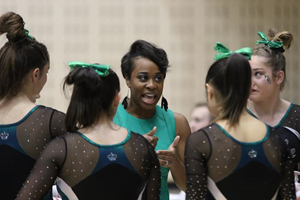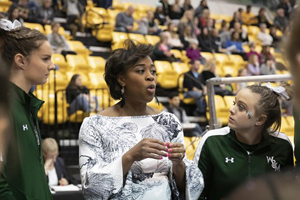Several years back, Kelsey Hinton wrote down her career goals in a notebook. Near the top, if not at the top, was becoming a head coach in Division I gymnastics. Never mind that a ridiculously low number of coaches looked like her.
That goal became reality in 2019 when Hinton replaced Mary Lewis, who retired after 25 seasons at William & Mary. Hinton had been a Tribe assistant the previous four seasons, and her time had come.
“I try to create short-term goals as well as long-term goals,” Hinton said. “I’m constantly doing that. My mom wrote a card for me — I think it was a Valentine’s Day card — that said I would become a D-I head coach.”
The addition of Hinton doubled the number of African-American female head coaches at the NCAA’s highest division from one to two. That’s out of 62 programs. She is third Black head coach in W&M athletic history — Trina Patterson (women’s basketball) was first, Mike London (football) was second.
“There’s a lot of value with our athletes and younger coaches to see people who look like them in positions of leadership,” said Mike Powell, W&M’s director of gymnastics.
“It provides an entre to putting themselves into positions of leadership and understanding themselves that way. I love that. That’s a part of what Kelsey brings to the entire program.”
Hinton’s first two seasons have been more eventful than expected. In 2019-20, her daughter was born in late February. She missed four meets on the road, and then the rest of the season was canceled because of the COVID outbreak.

The following year, the Tribe was able to compete in only three meets. For the second year in a row, the ECAC Championships didn’t happen.
This season has gone smoothly with the only cancelation (Jan. 22 vs. Penn) being weather related.
One thing stayed constant all along: the team’s strong academic record. In 2020-21, women’s gymnastics had a GPA of 3.81.
“They should be proud of themselves because that’s all them,” Hinton said. “They’re very driven people. We’ve created a culture where the expectation is to do your best and they do just that.”
Hinton was 9 years old when she watched Dominique Dawes compete in the 1996 Olympics. Seeing another African-American exceling in the sport inspired her. She competed with United Gymnastix in Reisterstown, Md., a short drive from her hometown in Owings Mills.
By signing with N.C. State, Hinton said, she became the first African-American gymnast on her club team to receive a college scholarship. In her senior year with the Wolfpack, she made second-team All-East Atlantic Gymnastics League in the floor and vault.
After earning her degree in sports management in 2008, Hinton was hired as class program manager and girls head coach at Kidsport Gymnastics Academy in Burlington, N.C. In 2015, she came to W&M as an assistant coach and recruiting coordinator. Four years later, she was promoted to head coach.
“It was great to see her as an assistant and the relationships she had with the athletes,” Powell said. “Always positive. She knows how to have fun and enjoy the process, but she has a good balance of challenge along with that.”
Statistically speaking, Hinton already has already achieved a major accomplishment. Of the 62 head coaches in Division I women’s gymnastics, two are African-American — Hinton and Umme Salim-Beasley of Rutgers. Rosters remain overwhelmingly white.
In August of 2020, an ESPN story detailed accusations of racism within several high-profile programs. Hinton believes that is largely rooted in the home and education.

“So many African-Americans have been left out of the history books used in the school system,” she said. “In the schools I attended, I learned about individuals who are not of color. But I didn’t learn about those who paved the way, who invented things we use every day, who fought and struggled to make my life easier.
“This is information I want my daughter to know, and what I will continue to teach in my household. I can’t leave that up to the school system.”
The issue, Hinton believes, is that those who are not of color are getting an incomplete picture from those history books.
“When that happens, you tend to question or maybe say the wrong things when people of color say, ‘You should know this about me,'” she said. “Black History Month should not be the only time we set aside the occasional quote or informational session to learn about people of color.
“I’m hopeful and waiting for the time where it isn’t celebrated that we have the first black person to do something. Whether or not you are in a position of authority, I look forward to the time where all positions of employment are colorful.”
There is some good news. In the most recent Olympics, half of the U.S. women’s team was of color. According to the NCAA Demographics Database, African-American percentages on Division I rosters has increased from 7.8% in 2012 in to 10.4% in 2020.
Not a monumental leap, but at least the trend is going in the right direction.
“One of my goals for the program is to build a more diverse team,” Hinton said. “We have some incoming freshmen who will add to that diversity for our team. To have one of the most diverse teams out there will add flavor, knowledge, and will be a recipe for success.
“When recruits email or call, I’ve had some say they didn’t realize we had an African-American head coach. But that is something they like and are not used to. I don’t ever take offense to that comment because today, that isn’t normal. That diversity factor is something that adds to a program.”
More good news came earlier this month when Fisk University in Nashville became the first HBCU to announce the addition of a women’s gymnastics program. The inaugural season is scheduled to begin next January.
“We had individuals like Simone Biles, Gabby Douglas, Dominique Dawes, Betty Okino, and others who have really paved the way,” Hinton said. “They let African-Americans know that it is possible. I’m really enjoying seeing more color in gymnastics now.
“We’re making our own history right now. My hope is that my daughter will not have to explain to anyone why her hair or skin looks the way it does and she will be able to embrace and celebrate who she is. Open the conversation channels and talk about it. We have to start now. Ignorance is a choice.”

